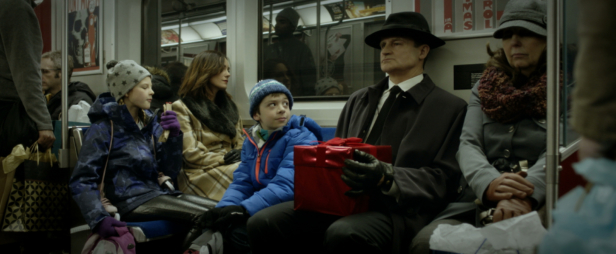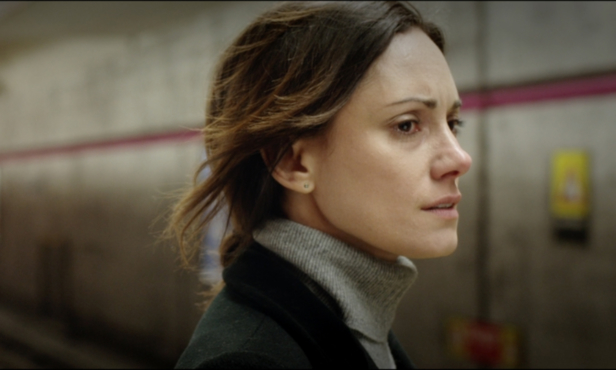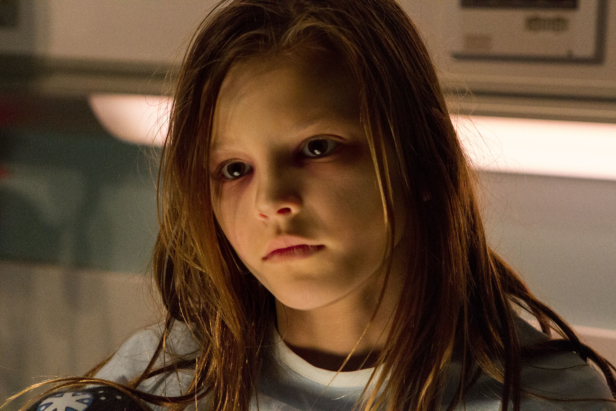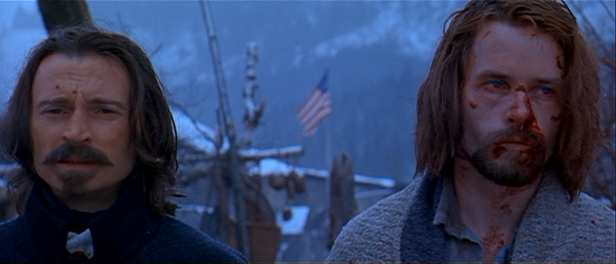We’ve been waiting for XX for a long time now. The all-women horror anthology film was announced back in 2013 and, after a few director changes, it’s finally arriving in the UK with Jovanka Vuckovic, Roxanne Benjamin, Annie Clark, Sofia Carrillo and Karyn Kusama behind the camera delivering creepy, stylish and chilling tales.
Vuckovic (The Captured Bird) based her short on master horror author Jack Ketchum’s terrifying short story ‘The Box,’ in which a young boy peers inside a stranger’s gift-wrapped box on the train home and promptly loses his appetite. Permanently. The boy’s mother (played by Natalie Brown) is at a loss, and witnesses her family’s disintegration as the days pass. What is happening? What did he see?
We talked to Vuckovic about the origins of the film, the challenges of putting something like this together, the disparity between opportunities available for male and female directors, and why she loves Antonia Bird’s classic Ravenous.
What was the genesis of XX?
Todd Brown, the producer at XYZ films, and I have been friends for a very long time and we had a similar idea at the same time. I was thinking about crowdfunding an all-women horror anthology and literally the same day he called me up and said something like “I noticed all of our female horror director friends are being passed over for jobs, not just on features but also on these horror anthologies that are coming out.” And his wife, who is a staunch feminist, had been pestering him saying “Hey, if you’re really a feminist, then how come you haven’t produced any movies for women yet?”
So he put his money where his mouth is and, realising that he’s a white man, realising that he couldn’t be the public face of something like this, he called me up. And we combined forces and I quickly abandoned my idea and concept and decided to help him with his. We just started making a list and calling directors and that was over three years ago. [laughs] Yeah it was quite a long time, I think I shot my segment over two years ago now. It’s been done and complete for a very long time and it’s been very difficult and challenging getting the film finished.
So the segments have kind of come together over time?
Yeah, right away Sofia was at the top of the list to do the wraparound segment. There was no one else that we considered. Todd and I had seen her work at Sitges and at Sundance and we were both big fans so we reached out to her first to ask if her if she would be willing to do the wraparound segments. Because we knew we didn’t want some kind of silly horror host in between the segments, like the Crypt Keeper talking about the stories, we didn’t want to go that route. We wanted to do something a little bit more artful.
So Sofia was basically given loglines for each of the segments, she would get one sentence and that’s all she had to work with when she was building those elaborate puppets. And then all of a sudden she’d get an email saying “Oh, this one director fell through, she can’t do it, here’s a new logline!” And she would have to start over!
I think out of all of us Sofia worked on this film the longest, because in terms of shooting time I had five days of shooting and a week of prep time. Roxanne and Annie shot theirs in three days, which is unbelievable, and Sofia worked on her stuff for a total of 60 days! So she worked a lot on this movie!
It must have been quite exciting to start putting the director wish-list together…
The director line-up changed so many times from the beginning, and some of that was due to good reasons. Mary Harron got a TV show greenlit and she had to go to Canada to shoot a TV series. So we were happy about that obviously. And very early on, Antonia Bird was somebody we were talking with to do a segment and she unfortunately lost a private battle to cancer during that time. She had said “Yes, I want to do it but I need to take some time off for health reasons,” and the next we heard, she had died.
So we dedicated the film to the memory of Antonia Bird. Because she was obviously a hero and a trailblazer for women directors and she was one of those few names that I could see when I was younger, a woman’s name at the beginning of the movie: “Written and directed by.” And there were so few Antonia Birds and Katherine Bigelows and these women whose names we could actually see and say “If they can do it, maybe so can I?”
So we thought we knew the line-up but mine was completed first, and then Karyn completed hers in 2015 and then Annie shot hers in 2016 and then Roxanne produced it for her and right after she wrapped Roxanne went into production on her segment. It finally came together very quickly at the end of 2016, just in time for the Sundance deadline. It’s very difficult to make a movie with 5 directors across 3 countries, multiple unions, there were so many different snags and problems that we had to sort out. And then when the whole project went DGA, we had to essentially start over when we became union and rearrange all the budget. So it’s been a very interesting journey!
Had you been wanting to do something based on ‘The Box’ for a while?
No, actually. My original idea that I had turned out to be far too ambitious and too expensive, so I put it on the back burner. Similarly Karyn had another idea too that was actually about eating disorders that she was unable to do because it was just going to be too impossible to do the starvation.
So I was talking to my friend Lucky McKee about ideas and, because he works a lot with Jack Ketchum, he reminded me about Peaceable Kingdom [Ketchum’s short story collection], and I remembered right away the standout story for me was ‘The Box’. I read it when it first came out in the ’90s and it just stood out because it’s not like his usual material. There wasn’t a single drop of blood in it and it was this weird Twilight Zone existential horror story and as soon as I thought of it I was like “OK, this is what I’m going to do.”
And I toyed with the idea of shooting it in black and white but then I thought that was just wearing your influences too much on your sleeve. Like, I love The Twilight Zone but…[laughs] I had to make it my own, so yeah, I called him up because I’ve known him for a long time and I asked for his blessing to make a couple of small changes. I also asked him what was in the box! And his answer was basically: “You know I can’t tell you that and get used to being asked that question for the rest of your career!”
There’s a lot that goes unsaid in the film, along with that rising tension. Was it difficult to fit a slow-burn into a short film?
That’s the challenge in general in doing short films. A lot of horror movies are all about the build, right? And the anticipation. And you have to dispense with everything that doesn’t advance the story forward when you’re doing a short and that’s why some of the shorts might feel abrupt with the endings, but you have no choice but to distil it to the basic beats. Everything else has to go.
So the only changes I made were that I changed the gender of the protagonist in order to fit the mandate of our movie, because it had to be all women leads, and I added the Christmas dinner scene. That’s not in the short tory and I added it because there was so much repetition of the food and emphasis on the food in the story, it was very descriptive of exactly what they ate and it felt like it lacked this cumulative Christmas dinner scene [You’ll know it when you see it]. So I wanted the family to have this very civilised dinner where they’re around the table carving the family turkey, using their utensils and manners. [laughs]
I felt like everything that Susan was feeling about her situation is evoked in that scene and it helped us get to know her a little more, because she’s so distant and difficult to know. It’s sort of this idea about motherhood, that’s the great thing about switching the gender of the protagonist is that suddenly all these new storytelling possibilities emerged and it could be a story about how not all women are meant to be mothers and the negative association, the negative feeling around motherhood and what that meant.
Some women resent the drudgery and routines and they feel trapped and consumed by their families and their children, and these are all totally normal feelings that aren’t really talked about that much in the movies. Women are more often depicted as doting mothers and loving girlfriends and props to their male counterparts. So yeah, that just made it a lot more interesting to me.
Do you think that things have been improving for women in horror films?
Well, on the independent scene there’s definitely been some more women writing and directing horror films but there are still no changes on a broader level. I hate to trot out statistics, but the diversity report in America was released and it actually shows a two percent decline in women directors from last year.
So the overall picture is quite grim but there’s movement happening on the independent level. And there’s always been women directors, but it’s just the next stage, right? Which is always much more difficult to women. They’ll make their first feature and they’ll go to Sundance and then they’ll spend years and years and years trying to get financing for their second feature and if they get it, it’s not the same budget as their male counterparts might get.
There’s a lot of examples of the male director makes a movie for half a million dollars and then is directing the next Godzilla movie or the next Star Wars movie, they make this jump from half a million to 200 million dollars. That’s never happened in the history of film to a woman, it happens a lot to men, and I have a feeling like it’s probably not going to happen in my lifetime. I might have to go all Werner Herzog and say I’ll eat my shoe if that ever happens in my lifetime.
It’s a complex problem with no easy solution, it’s on that bigger budget level that women aren’t getting those budget and the opportunities and they’re simply not being hired. But this isn’t a hill to die on and we’ve got to keep going. We all want to keep our heads down and keep working and keep creating. Because sometimes that’s the only way to fight a problem, is to keep making art, right? So thankfully we do have recent spate, like Alice Lowe on Prevenge and Julia Ducournau’s Raw and Jennifer Kent’s The Babadook. There are these independent horror films directed by women that people really love. And that’s good! We’ve just got to keep going.
What do you have coming up next?
I’m working on a feature film called Riot Girls which is not a horror movie, it’s a sci-fi action movie with kids, I keep calling it a post-apocalyptic coming-of-rage love story! It’s not a horror film but it’s got kids doing horrible violence to each other so it’s not exactly a family movie either! And it’s the only thing that I’m developing right now that I didn’t write myself.
It was written by Catherine Collins who’s currently writing the reboot of Lost In Space for Netflix, that’s the one that Neil Marshall is involved in. So she’s an incredibly gifted writer and the reason why I chose to be involved in it is because the story is just so good and I read a lot of really lousy horror scripts! That just depict women as paper bags and this one seemed to be just very honest and it’s very diverse in a very sincere way. I’m attracted to stories that break the rules and it’s kind of a genre bending movie, and it’s about these young girls finding themselves in this horrible situation. I’m hoping to be shooting at the end of the summer. Lots of other stuff cooking too but that one’s the priority.
We’ve got time for one last question, so I just wanted if you could talk about why you love Antonia Bird’s Ravenous? That’s definitely one that’s genre-bending…
Yeah, it is genre-bending, because it’s kind of a black comedy, right? And it’s also an indictment of manifest destiny and it’s also a supernatural horror film and a monster movie, and all these things. It’s a satire! It’s amazing to me that she was able to do all that, even though it was an assignment for her! It wasn’t a project that she developed from inception, it was an assignment when another director fell through and she was able to jump in and really get the material, and get those incredible performances from the actors. Robert Carlyle at his absolute scariest, pants-shittingly scariest! And also she made those scenes of violence incredibly effective.
It just works on so many levels and it’s a very underrated, unique gem. I don’t know anybody that doesn’t like Ravenous.
XX will have a one-night-only theatrical event with a filmmaker Skype Q&A thanks to The Final Girls on 3 May and you can find information here. XX is released on DVD on 8 May. Keep up with the latest genre news with the new issue of SciFiNow.




